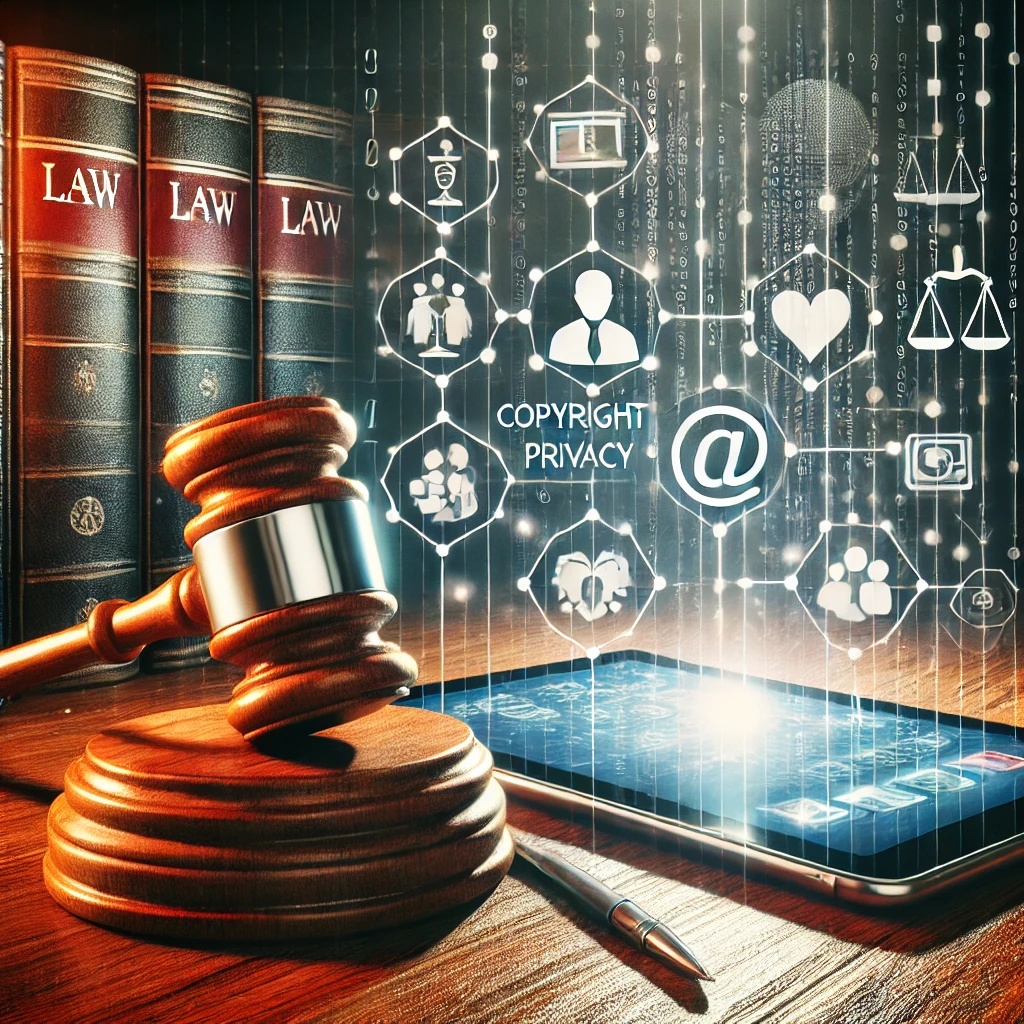Legal Challenges in the Digital Age: Navigating Copyright and Privacy Issues Online
The digital age has transformed the way we live, work, and communicate, creating a complex and ever-evolving landscape of legal challenges. From the explosive growth of the internet and social media to advances in artificial intelligence (AI) and blockchain, technology has blurred traditional legal boundaries, particularly in areas related to intellectual property, data privacy, and copyright. This article explores the legal and copyright challenges faced in the digital world, examining the ways in which traditional laws are adapting—or struggling to adapt—to modern innovations.
Copyright and Intellectual Property in a Borderless World
The internet has made it easier than ever for users to access, share, and distribute content across the globe. While this connectivity has fostered creativity and collaboration, it has also given rise to significant copyright and intellectual property (IP) challenges. Content creators, such as artists, musicians, and writers, often find their works used, reproduced, or modified without permission, undermining their rights and potential revenue. For example:
- Unauthorized Copying and Distribution: Digital platforms allow for easy duplication and distribution of works. This reality often leaves creators vulnerable to unauthorized use of their content, with minimal means of recourse.
- Jurisdictional Issues: IP laws vary widely from country to country, and the internet’s global nature complicates enforcement. When copyright infringements occur across borders, determining the applicable laws and enforcement mechanisms becomes challenging.
- User-Generated Content: Platforms like YouTube, Instagram, and TikTok encourage users to create and share content, but they also host large amounts of copyrighted material, much of which is shared without permission. Determining accountability, whether it lies with the user, the platform, or neither, poses ongoing legal challenges.
Fair Use and Its Limitations in the Digital Era
The concept of “fair use” is a key component of copyright law, allowing for limited use of copyrighted material without permission, typically for purposes such as commentary, criticism, news reporting, or education. However, as digital content becomes more accessible and remixable, the boundaries of fair use are tested. Courts often face difficulty determining when a digital work falls under fair use, as factors like the purpose of use, amount of content used, and market impact are increasingly complex to assess.
For instance, social media users frequently create “memes” or remix videos that incorporate copyrighted material. While many consider these creations to be transformative, providing new meaning or context, they may still infringe on the original creator’s rights. Courts struggle to balance creative freedom with the need to protect original works, leaving creators and users alike in a state of legal uncertainty.
The Rise of Artificial Intelligence and Copyright Implications
The advent of AI has added a new dimension to copyright law. AI technologies are now capable of generating art, music, and even literature autonomously, raising questions about authorship and ownership. If an AI program generates an original piece of music or a unique work of art, who owns the copyright? Is it the programmer, the user who initiated the AI’s creation, or is it not eligible for copyright at all?
The legal system has not yet provided clear guidelines on these issues, and courts may face challenges in adapting existing copyright frameworks to account for AI-created content. Furthermore, the use of AI to replicate or mimic copyrighted works without the original creator’s consent—such as “deepfake” videos or synthesized voices—presents additional legal concerns, including potential damages to creators’ reputations and lost revenue.
Data Privacy and Digital Rights Management
In addition to copyright concerns, data privacy has emerged as a significant legal challenge in the digital age. Companies and platforms often collect, store, and analyze massive amounts of personal data, raising ethical and legal questions about user consent, data ownership, and security. Key issues include:
- Consent and Transparency: Users are often unaware of the extent of data collection and how their data is used or shared. Although laws like the General Data Protection Regulation (GDPR) in the European Union aim to protect user privacy, enforcing these laws globally remains challenging.
- Digital Rights Management (DRM): DRM technologies are used to prevent unauthorized access and copying of digital content. However, DRM is often seen as restrictive and can infringe on users’ rights, such as the right to make personal backups of purchased digital goods. Additionally, DRM restrictions can create accessibility barriers for individuals with disabilities.
Balancing Innovation with Legal Frameworks
As technology continues to evolve rapidly, legal systems around the world struggle to keep pace. Policymakers and legislators face the difficult task of crafting laws that protect creators, uphold individual rights, and foster innovation without stifling it. Achieving this balance requires an understanding of technological trends and their social implications, along with cooperation between legal experts, technologists, and industry leaders.
One promising approach is the concept of “digital literacy,” which advocates for better education on legal issues related to the digital world. By equipping users with the knowledge to understand copyright, privacy, and data protection laws, society can create a more informed and responsible digital community. Similarly, introducing frameworks that encourage responsible innovation—such as the “privacy by design” approach, where data protection is considered from the outset of technology development—can help mitigate legal risks associated with new technologies.
Conclusion
The digital age has brought unprecedented opportunities for creativity, expression, and connectivity. However, it has also introduced complex legal challenges, especially in the realm of copyright and privacy. As traditional legal frameworks strain to accommodate new technologies, ongoing efforts are needed to develop adaptive policies that protect creators’ rights, respect user privacy, and promote responsible innovation. The future of digital law will depend on a balance between fostering creativity and upholding ethical standards in a landscape that is increasingly digital, interconnected, and driven by technology.
Legal Challenges in the Digital Age: Navigating Copyright and Privacy Issues Online
Recommended Post
How Targeted Digital Ads Help Musicians Reach Their Ideal Audience
